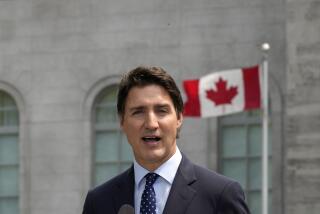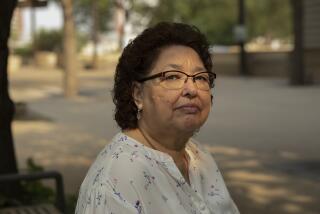Short on Donated Sperm, Canadians Reluctantly Turn to U.S.
TORONTO â In a country where national identity rests less on being Canadian than on not being American, having to turn to the U.S. to ease its latest crisis could hardly be worse.
Canada, you see, is short of sperm.
Last March, the nationâs health authority--Health Canada--quarantined the countryâs sperm banks after a woman contracted chlamydia, a common sexually transmitted disease that can cause sterility, from a donor sample. As a result, the authority froze the banksâ deposits, beefed up testing requirements to make them the most rigorous in the world and applied them retroactively to cover samples already in the banks.
But many of the facilities, even with the help of private investigators, were not able to find enough of the original donors to perform the necessary retesting. Their stocks took years to collect, and they couldnât sustain themselves until they obtained fresh supplies that met the new standards. From a total of 57 sperm banks, fewer than 10 are still in business.
Donors Declining
Enter the U.S., whose private sperm banks control an estimated 65% of international business in semen distribution and are now fulfilling more and more of Canadaâs needs.
âOrders from the U.S. have increased a hundredfold in the last year,â said Roger Pierson, a recent president of the Canadian Fertility and Andrology Society. âAnd demand is likely to increase.â
The shortage will probably continue for another year or two, even though new supplies collected last year are available, because fewer men are lining up to replenish the total. For one thing, donors must now undergo urine and blood tests for several transmissible diseases, including two HIV tests six months apart. For another, volunteers are paid only between $20 and $40 per sample for their trouble. And a recent British court decision that children of donors have the right to know the donorsâ identities has frightened away potential Canadian volunteers leery of the possibility that the same thing could happen across the Atlantic.
âThe quarantine came at a time when donor interest was declining anyway. But now, because testing is more thorough and people are becoming more concerned about privacy, interest in being a donor in Canada is at an all-time low,â Pierson said.
But not in the United States, where donors are plentiful, are paid a little more and are increasingly willing to share information about themselves. Xytex Corp., a Georgia-based company that set up an office in Toronto in November, even has a Web site where potential recipients can choose a donor by ethnicity, hair and eye color, blood type and education. Some donors provide baby pictures, current photos and even videos of themselves. Eight of Xytexâs donors say they would be willing to meet a child they helped produce.
âOne-third of all foreign orders come from Canada now,â said David Towles, Xytexâs public relations director. âDemand for our donors has grown 10 to 15% since last March.â
Vigorous Sperm
In the high-stakes world of aided insemination, sperm count also matters, and some Canadian doctors have found American semen to be better, stronger and faster. Many of the Canadian programs were university-based and relied on students for their stock. But students are hard to keep track of, and though they are among the countryâs best and brightest young men, they arenât always the super-producers that private suppliers cultivate and rely on. Some clinics found these public-facility samples less consistent than the stock provided by private suppliers.
âThe truth is that we get better results with U.S. sperm,â said Dr. Judith Campanaro, a fertility specialist at the ISIS-Regional Fertility Center in a suburb of Toronto, which now gets 99% of its samples from across the border.
But some patients, even though their chances may be better with U.S. samples, want only a Canadian donor.
âCanadians donât want to be perceived as Americans,â said Campanaro. âThey identify themselves as not American, even--or maybe especially--on a cellular level.â
For these patriotic few, Xytex is recruiting Canadian donors out of its Toronto office but will store the samples at its headquarters in Georgia and ship them back to Canada when theyâre ordered. Its new Canadian donors havenât been cleared yet, since the samples must be held for six months until the donors are retested for HIV, which can take half a year to incubate.
Other potential recipients are reassured by the distance between where they live and where the sperm they purchase hails from--a distance that reduces the chances of bumping into a donor at the supermarket or of their childâs meeting, or marrying, another of the same donorâs offspring. And then there are members of ethnic groups that are not well represented in Canada or have cultural attitudes that inhibit donations--notably Asians, Indians and Orthodox Jews--and who sometimes have to seek donors outside the country.
Before the quarantine, an average of 3,500 Canadian women used donor sperm to conceive, according to Health Canada. Although the agency does not yet have post-quarantine statistics, a spokesperson said that even with imported semen making up some of the shortfall, the number of inseminations has decreased âdramatically.â
The women who are affected most by the current quarantine are those who have had a child by a certain donor and want their second child to be a biological sibling. Suddenly, the samples that would permit that are out of reach. In December, Health Canada set up a Special Access Program to provide samples from the same donor on a case-by-case basis.
âItâs caused a lot of problems,â said Campanaro. âIt takes reams of paper and lots of time.â And the longer women wait, the more their chances of conceiving decrease.
âIâve already had one child from that donor, and there was no problem,â said a single mother who didnât want to reveal her name because of the personal nature of assisted conception. âIâve paid for the samples. Iâve used them. Why should they be withheld from me if Iâm willing to take the chance?â
In a few cases, Xytex has sought out donors who have retired or moved on to ask them to provide more samples. But some Canadians are taking a more direct approach.
Last year, Jacqueline Beaudoin, an alternative health care provider, set up a Web group to match women who wanted to conceive with men who were willing to help. She and her partner, Valerie, had been trying to have a child with the help of a doctor and were frustrated by the process.
âCreating a baby should not have to be like getting a Pap smear,â she said. âWe wanted to bring it home and make it private.â
The couple ordered semen from an American sperm bank, but it was held up at customs by mistake, and the samples thawed. Through the Web group, though, Beaudoin found a donor who had given through banks before and had taken all the required tests. He put the sample in a container designed specifically for transporting semen and mailed it Federal Express, Priority Overnight.
Beaudoin is still trying to conceive. But 14 other women who contacted donors through the Web list have had babies. It is up to each woman whether to meet or mail, to rely on tests or faith, and to work out any payments or legal obligations.
âWeâre all responsible for our own decisions and their outcomes,â Beaudoin said.
Privacy Preferred
But most Canadians arenât willing to take those risks. And despite the greater availability of information about American donors, many prefer to know less rather than more. Because infertility and aided conception still carry a stigma in Canada, some people prefer to pretend not to reveal that they used outside help.
âThere are a huge number of emotional issues involved,â said Heather Brooks, a counselor at Outreach Health Services in Toronto.
When selecting a donor, married patients usually look first to match the blood type with the husbandâs, especially if they are not going to reveal that they used a donor to conceive. But Brooks advises patients to tell their children the truth about their origins.
âYou build a relationship with a child on trust. Secrets donât always stay secrets. What if they find out that Dad is not really Dad?â she said.
Meanwhile, Canadian sperm banks are struggling to be competitive. Repromed, one of the few facilities that is still able to distribute Canadian semen, nearly closed when the retroactive regulations were abruptly announced and most of its supplies were quarantined. But because it had been experimenting with new tests for chlamydia before the revised rules, it managed to stay open with a few specimens.
âWe have been able to regroup and move along,â said Repromedâs director, Dr. Alfonso del Valle, who added that it now has 40 approved donors available. While he said he welcomes the genetic diversity brought by the American imports, he believes that American supplies arenât monitored as closely as those at Canadian clinics.
âI have some concerns,â he said. âThe imports are not inspected. We must take it on faith that they did the tests they said they did.â
Caution a Trait
Indeed, in the United States, unlike Canada now, sperm banks are guided by health regulations, not laws. But Campanaro of ISIS said U.S. standards are as high as they are because of two quintessentially American qualities: âlitigation and competition.â
Canada, in turn, will be protected by two of its national characteristics: caution and regulation.
âCanada has the most rigorous regulations in the world now,â said Jill de Villafranca of the Canadian Fertility and Andrology Society. âIf you got sperm through Canada, you can be sure itâs safe.â
More to Read
Sign up for Essential California
The most important California stories and recommendations in your inbox every morning.
You may occasionally receive promotional content from the Los Angeles Times.










